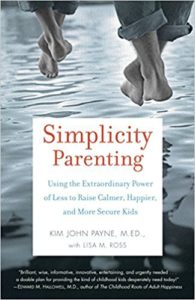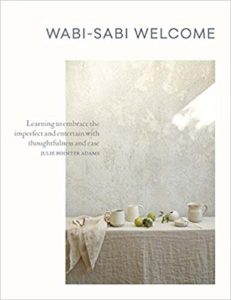
Everything around the college campus got a bit wonky when the sociology classes would do their social experiments on the rest of us. One girl started randomly holding hands with her guy friends. Another guy sat down with total strangers in the cafeteria during each meal. And another boy barked at people as he walked behind them on the way to class.
I’m not asking you to do any of those things. Most of the experiments I have in mind can be quietly conducted with little evidence at all that you are attempting to buck social norms. But they will require you to step out of what might be most comfortable for you.
Are you ready to be weird with me?
I’ve tried out most of the ideas in this list, but a few are new goals for a new year. Each of these ideas will help you to slow down, save money or live more simply. As you read, consider joining me in a few of these experiments this year. Here we go.
1. Stop buying cheap/new clothes
 Kick off this social experiment by watching the documentary The True Cost on Netflix. Or read this book about fast fashion for an overview of how the clothing industry of cheap, disposable clothing (like Forever 21) not only exploits cheap labor in other countries, but fills our landfills.
Kick off this social experiment by watching the documentary The True Cost on Netflix. Or read this book about fast fashion for an overview of how the clothing industry of cheap, disposable clothing (like Forever 21) not only exploits cheap labor in other countries, but fills our landfills.
Many larger cities have Once Upon a Child for good, quality used children’s clothing, 29 states have the adult version of this, called Clothes Mentor. I’ve had a lot of luck at our local thrift stores, though you can’t necessarily go with a single item in mind.
I’ve been doing this for nearly two years and have managed to buy all used clothing for myself and my family apart from shoes, underwear, socks and boy’s 4T and 5T pants (they wear out too quickly!) When we haven’t gotten used, we’ve tried to at least buy American-made, though that can get pricey.
If you’re like me and don’t want to schlep a bunch of kids with you to a thrift store, then there are a ton of online options for you. One is called ThredUp and has a great referral program where you get $10 to spend and the person you refer gets $10 to shop after they place their first order (this link includes my referral code–no extra cost to you!).
Later this month, I’ll be publishing a long list of places to buy used clothing, so stay tuned.
2. Don’t throw food away–ever
As much as 40% of our food goes uneaten in the United States, according to a Harvard study. Another article from USA Today says, “if we were able to recover all of our wasted food, we could provide a 2,000-calorie diet to 84% of the population, said Dr. Roni Neff, a Johns Hopkins University researcher who led a first-ever study examining the nutrients we’re tossing in the trash.”
I think it comes from my years living in China on a missionary’s salary, but I live like someone who went through the Great Depression. Throwing food away is a mortal sin in our household.
Most expiration dates have several days or even weeks of leeway added in, so stretch your food a little farther. Another way to waste less is to meal plan. When each vegetable in your fridge is bought for a purpose, you are less likely to throw wilted, unused veggies away at the end of the week.
Now that I live in Colorado, it’s time to join the masses here who compost. I haven’t purchased one yet, but I’m considering buying either this small composter you keep in your kitchen, or a larger one that goes right in your backyard. Both have really good reviews on Amazon. Have you composted? I’d love to hear some tips!
3. Do a phone detox
I’ve only done this once, for a week, but it was magical. I heard birds, I saw butterflies and I talked to old ladies on benches. But I haven’t done it again. So by writing this, I’m building in a bit of accountability for myself. I plan to stay off my phone during my Sabbath times (see #8) and take a more extended break from my phone one or two weeks during the year. I also plan to remove all social media and email apps from my phone except Instagram (I just can’t). The book Glow Kids has some terrifying data about how screens are affecting us and our children if you need some convincing that this might be a good idea.
In 2017, a bunch of high schoolers in Colorado pledged to stay off social media during the month of October, which sounds like something I might like to try. Otherwise, I’m thinking Lent would be a good time to go off my phone or at least off some or all social media (can you tell this is a problem for me?)
What about you? What kind of phone detox would work for you this year?
4. Invite a non-family member to your home every week
With an introverted husband, once a week may be a bit much, but since plans often get cancelled, we are shooting to invite someone over to our home for a meal or to play games at least once a week. Whatever we do often enough becomes habit, so we want to make this a priority this year. I’ve found that asking is the hardest part, but after that, I rarely regret having people into my home. Many of us attend churches and small groups, so it is easy to get caught in the Christian bubble. But who did Jesus eat with? We want to share our table with people who are like us, but also those who are very different from us this year. The books The Art of Neighboring and Making Room have revolutionized the way I now practice hospitality. If you’re interested in learning more about hospitality, check out the Facebook group called “Sorta Hospitable” that I started in December.
5. Make awkward small talk
I’ve written a bit about this, but I’m trying to be intentional about noticing the people around me. By attempting to talk to the grocery cashier, server at the restaurant or neighbor walking his dog, I can learn to appreciate people made in the image of God. Even though I’m an extrovert, I would rather have a one-on-one heart-to-heart any day than try and shoot the breeze with someone. But sometimes awkward small talk is the gateway to relationship. I met one of my best friends from the last two years at the park, so I know it’s possible.
6. Own less toys
The book Simplicity Parenting influenced many of my opinions on the stuff our kids have. Kim John Payne writes: “Nothing in the middle of a heap can be truly valued. The attention that a child could and would devote to a toy is shortened, and eclipsed by having too many…Ironically, this glut of goods may deprive a child of a genuine creativity builder: the gift of their own boredom.”
Simply put, “As you decrease the quantity of your child’s toys and clutter, you increase their attention and their capacity for deep play.” (p. 62)
My friends and family have given me a hard time about this, but we have a “no gift” rule for birthday parties. Fortunately, my oldest is still pretty young (5), so he hasn’t been to a ton of birthday parties, but I’m usually able to convince him that gifts from his parents and grandparents are sufficient. We also tell him that the party itself and all his friends being there are his gift (which he believes for now).
And while we do purchase some new toys for our kids (these have been a HUGE HIT), we encourage the grandparents to contribute money to pay for experiences like museum passes or gymnastics lessons instead of buying them new toys. The toys we do have, we keep in the garage and switch out when the ones inside aren’t being played with as often.
7. Have someone live with you
Have you ever thought of having someone live with you? We unexpectedly had a Saudi Arabian girl live with us from 2012 to 2013 and it was such a positive experience that we bought our new house with that in mind. Several of my friends have had exchange students live with them or housed an international student like we did. Yes, it’s challenging to have someone in your space, but the deep relationships, cultural learning, and authentic living that come out of it is so worth it. We just found out we’ll be having a girl from India live with us until May, so we are excited and nervous about sharing our space again.
8. Observe the Sabbath
Out of all of these, this is the hardest for me. My main problem is that so many of the activities I enjoy doing–writing, running, and spending time with people, which some might consider Sabbath activities, often just serve to make me busy. My husband and I are also puzzled about observing the Sabbath when we have three children, age five and under. I need to revisit some of the posts I wrote for Seven Days of Soul Rest back in December of 2015… It may finally be time to read the book Rhythms of Rest. For my personality type (ENTJ), I know I need structure of some kind, but I also kind of hate rigid rules. Help.
9. Have your kids share a room
I plan on smooshing our kids together until my daughter is grossed out by her older brother. I’m guessing I have another three years … Right now, she is equal to the task. I want to do this is so we can have a guest room available for people who need a place to crash. St. John Chrsystom called this the “Christ room,” referring to the passage in Matthew 25 where Jesus said, “I was a stranger and you took me in.” Because we still have little kids in our home, I don’t think we’ll be hosting homeless or those coming straight out of prison (though I’m conflicted about that, honestly), but we are open to hosting strangers and have already had some opportunities to use our home in that way.
10. Read a book every month that takes you out of your comfort zone
Personally, along with reading more fiction and poetry (I’m a non-fiction girl), I’m aiming to read at least six books written by people of color this year. I only average about two books per month, so that’s a book every other month by a person of color. I have several books that will stretch you on this and this list. I’ve found that book clubs are a great place to challenge yourself as a reader and read books you wouldn’t choose otherwise.
***
So that’s it! Not too weird, really, and maybe you already do many of these things. What are some of your goals for 2018 that will help you to slow down, save money and live simply in the new year? I’d love to hear your thoughts on this list or on your own plans!
Here are the books mentioned in this post:
Simplicity Parenting
Glow Kids
Rhythms of Rest
The Art of Neighboring
Making Room
Overdressed
Have you signed up for my newsletter yet? I’ll be announcing some exciting changes in my next post, so be sure you don’t miss it!
***
This post contains Amazon affiliate links. Anytime you click on a link and make a purchase, you will pay the same amount, but I will receive a minimal commission.

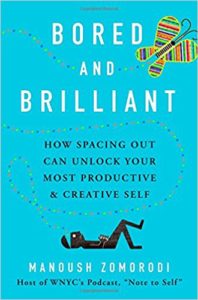 Bored and Brilliant: How Spacing Out Can Unlock Your Most Productive and Creative Self
Bored and Brilliant: How Spacing Out Can Unlock Your Most Productive and Creative Self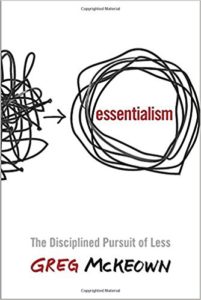 Essentialism: The Disciplined Pursuit of Less
Essentialism: The Disciplined Pursuit of Less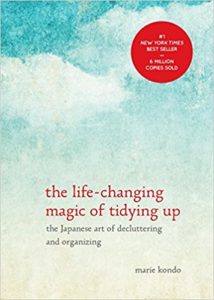 The Life Changing Magic of Tidying Up
The Life Changing Magic of Tidying Up The Quotidian Mysteries: Laundry, Liturgy & ‘Women’s Work’
The Quotidian Mysteries: Laundry, Liturgy & ‘Women’s Work’ Thank you for meeting me here in this space. The theme for March is “Simplify,” so you can start here to read posts you may have missed. If you are a writer or just a person with words burning in your soul and are interested in guest posting, email me at scrapingraisins@ gmail (dot) com. Our theme for next month (April) is “books and writing.” I’m looking for personal stories on this theme in the 500-1000 word range. If you haven’t yet, be sure you sign up for my mid-month and monthly secret newsletter for the latest posts and even some news, discount codes and book giveaway information that only Scraping Raisins subscribers get!
Thank you for meeting me here in this space. The theme for March is “Simplify,” so you can start here to read posts you may have missed. If you are a writer or just a person with words burning in your soul and are interested in guest posting, email me at scrapingraisins@ gmail (dot) com. Our theme for next month (April) is “books and writing.” I’m looking for personal stories on this theme in the 500-1000 word range. If you haven’t yet, be sure you sign up for my mid-month and monthly secret newsletter for the latest posts and even some news, discount codes and book giveaway information that only Scraping Raisins subscribers get!







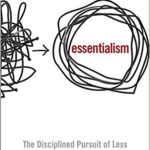

 Free Range Kids
Free Range Kids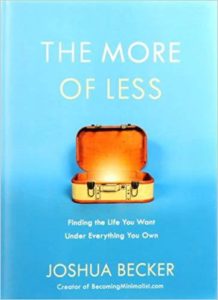 The More of Less
The More of Less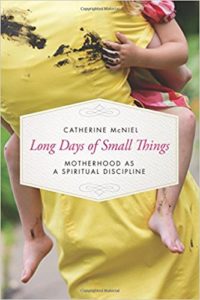 Long Days of Small Things
Long Days of Small Things